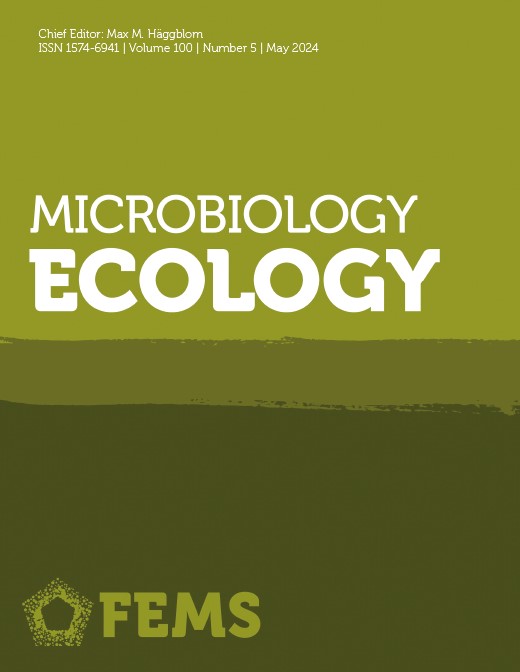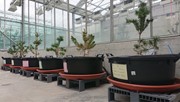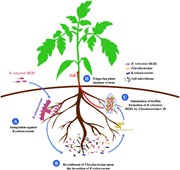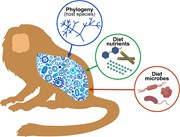
Leading research in the microbial ecology community
- Fully open access journal as of January 2024
- Fast & fair peer review
- Surplus revenue from the journal goes to supporting the furtherment of the microbiology field
- 2022 Impact Factor: 4.2
- 2022 CiteScore: 7.7
- 2023 downloads: Over 1.1 million
FEMS and Open Access: Embracing an Open Future
As of January 2024, FEMS has flipped four of its journals to fully open access (OA), making six out of its seven journals OA. FEMS Microbiology Letters remains a subscription journal and free to publish in.
We are excited to be making high quality science freely available to anyone to read anywhere in the world and further supporting the advancement of our discipline.
Publishing with FEMS Microbiology Ecology
The FEMS Journals are the perfect home for your Microbiology research
FEMS is committed to helping support microbiologist do their work, promote the best in microbiology research and knowledge to the world, and bring microbiologists together to share that knowledge.
Authors provide scientific content and are what make a journal exist in the first place. Publishing with a FEMS journal means you are investing in science. Together with Oxford University Press, and thanks to the hard work of our editors, there are a series of benefits and initiatives that we offer to ensure a smooth and successful submission process.
Instructions to authors
FEMS Microbiology Ecology aims to ensure efficient publication of high-quality papers that are original and provide a significant contribution to the understanding of microbial ecology. The journal contains Research Articles and MiniReviews on fundamental aspects of the ecology of microorganisms in natural soil, aquatic and atmospheric habitats, including extreme environments, and in artificial or managed environments. In addition, the journal publishes Perspectives, Current Opinions and Controversy Articles, Commentaries and Letters to the Editor on topical issues in microbial ecology.
Calls for Papers from FEMS Microbiology Ecology
Authors are invited to submit to the journal on a wide range of topics. Current calls for papers from FEMS Microbiology Ecology include:
- Rhizosphere - A One Health Concept
- Engaging the Next Generation of Researchers – Microbial Ecology for a Sustainable Future
- Interactions across Microbial Ecosystems
- Aquatic Microbial Ecology
- Subsurface Microbiology
- Thermophiles
- Microbial electron transport
Read and publish agreements
Oxford University Press has Read and Publish agreements with over 25 institutions and consortia around the world allowing affiliated researchers at participating institutions to:
- publish accepted articles open access in OUP journal, with their institutions covering the open access publication charge
- read high quality, high impact research from OUP's prestigious journals
Thematic Issues
Polar and Alpine Microbiology 2024
Microorganisms, representing all domains of life, have successfully colonized Earth’s cold habitats. This thematic issue focuses on the microbial ecology of the cryobiosphere. Knowledge of the biodiversity and functional roles of microorganisms inhabiting these cold environments is essential to our understanding of ecosystem processes in a changing climate. This issue has been prepared in connection with the 9th International Conference on Polar and Alpine Microbiology held in Potsdam, Germany on 9-14 October, 2022.
Anaerobic Biological Dehalogenation
Knowledge on anaerobic microbial dehalogenation has advanced significantly since its first discovery. This special thematic issue showcases that there remains a lot yet to be discovered regarding anaerobic biology dehalogenation.
Sustainable Agriculture
Agriculture plays an essential part in maintaining and growing the economy. This thematic issue explores the importance of sustainability in enabling agricultural ecosystems to thrive. Explore the articles that demonstrate the growing potential of sustainable agriculture.
Microbes vs Metals
Metals play a key role in our daily lives and affect everything from healthcare to industrialisation and our culture. Explore the articles in this collection which demonstrate the unique and complex relationship between microbes and metals.
Virtual Special Issues

Microbes and Climate Change
FEMS Microbiology Ecology have brought together a host of research to create this Virtual Issue on Climate Change. From changes to habitat characteristics through glacier melt-down to soil fungal assembly in the subarctic tundra, this collection delves into interesting research around the ever-present topic of Climate Change.

Landmarks in Microbiology: Anammox
FEMS Journals are pleased to share the first collection in our ‘Landmarks in Microbiology’ Series. Explore a variety of papers that have developed from the first description of Anammox in FEMS Microbiology Ecology in 1995.
Browse the articles | View more virtual issues from all FEMS Journals

Six Key Topics in Microbiology
Explore the latest research trends in the field in our new Virtual Issue covering six key topics in Microbiology. Featuring articles from across all 7 FEMS journals, the collection showcases the high quality and diverse research that FEMS provide.
Browse the articles | View more virtual issues from all FEMS Journals

Conference on Physiology of Yeasts and Filamentous Fungi (PYFF7)
Read a collection of yeast and fungal research, following the Conference on Physiology of Yeasts and Filamentous Fungi (PYFF7).
Browse the articles | View more virtual issues from all FEMS Journals
Webinars
Ecology of Soil Microorganisms II
This webinar is the second webinar to from FEMS Microbiology Ecology to focus on the ecology of soil microorganisms. Discover the secrets of how soil bacteria and fungi respond to stress conditions, habitat restoration, and changing climates and unveil the remarkable adaptations and roles of these microorganisms in regulating ecosystems. Speakers included: Emily Solly (ETH Zurich), Nicholas A. Barber (San Diego State University), and Ana E. Escalante (Universidad Nacional Autónoma de México).
Biogeochemical Cycling
This webinar covers the topic of biogeochemical cycling featuring three recent papers from the journal. From the use of a new ‘agar pillar’ approach to study the ecology of cable bacteria in freshwater systems to the population dynamics of nitrifiers in drinking water treatment plant biofilters, you won't want to miss this webinar. Speakers include: Tillmann Lüders (University of Bayreuth), Martyna Glodowska (Radboud University), and Ameet Pinto (Georgia Institute of Technology).
Microbial Ecology in Changing Climate
The interplay of microbial communities and the changing climate is a complex issue. In this webinar, we explore the results from three recent papers that discover the effects of climate change on microbial ecosystems. Speakers included: Ari Jumpponen (Kansas State University), Laura Zucconi (University of Tuscia, Largo dell'Università), and Elliot Scanes (University of Technology Sydney).
Approaches, Methods and Challenges in Microbiome Research
This webinar explores some of the new developments and challenges in microbiome research methods and takes a critical look at what we can learn about the inhabitants of diverse microbiomes and their possible functions. Speakers included: Bastian V H Hornung (Leiden University Medical Center), Lee J. Kerkhof (Rutgers University), Francisco Pascoal (University of Porto), and Catarina Magalhães, (University of Porto).
More from FEMS Microbiology Ecology

High-Impact Research Collection
Explore a collection of most read and most cited articles making an impact in FEMS Microbiology Ecology published within the past two years. This collection will be continuously updated with the journal's leading articles so be sure to revisit periodically to see what is being read and cited. Plus don't miss the trending articles from Altmetric.

Editor's Choice Articles
Explore a selection of the editor’s choice articles, covering microorganisms in soil, aquatic, and atmospheric habitats, and including natural, artificial and managed systems.
2023 FEMS Journals Article Award Winners: FEMS Microbiology Ecology
Congratulations to the winning authors of the 2023 FEMS Microbiology Ecology Article Award: Ate H Jaarsma, Katie Sipes, Athanasios Zervas, Francisco Campuzano Jiménez, Lea Ellegaard-Jensen, Mariane S Thøgersen, Peter Stougaard, Liane G Benning, Martyn Tranter, and Alexandre M Anesio for their paper, 'Exploring microbial diversity in Greenland Ice Sheet supraglacial habitats through culturing-dependent and -independent approaches'.
Submit a paper for publication in 2024 for a chance of winning the €1,000 prize. Find out more about the prize.

Email alerts
Register to receive email alerts as soon as new content from FEMS Microbiology Ecology is published online.
More from FEMS

Federation of European Microbiological Societies (FEMS)
The Federation of European Microbiological Societies (FEMS) is made up of an active and diverse network of around 30,000 professionals who are committed to advancing microbiology for the benefit of society in the areas of health, energy, food, materials, and the environment. Set up in 1974, FEMS is now a growing coalition of 56 Member Societies from 40 countries.
FEMS commitment is to help support microbiologists do their work, promote the best in microbiology research and knowledge to the world, and bring microbiologists together to share that knowledge.

Contact FEMS
FEMS Editorial Office, Delftechpark 37A, 2628 XJ Delft, The Netherlands
Tel: +31 15 302 0050
FEMS2023 10th Congress of European Microbiologists
Thanks to all who attended! FEMS2023 was the biggest event in Europe this year dedicated to showcasing the latest development across the broad scope of microbiology. We reconnected with microbiologists from all over the world and enjoyed 10 main topics on microbiology from our speakers.

#FEMSmicroBlog
The #FEMSmicroBlog highlights the fascinating aspects of all things microbiology. The blog presents recent microbiology papers, gives a voice to members of the FEMS community, tells fascinating and lesser-known facts about the history of microbiology, reports about events and meetings, highlights the global relevance of microbiology, and more.
Browse the #FEMSmicroBlog to read more about your favourite microbiology and research topics!



 Microbiome studies need to consider not only interactions between individual microorganisms, but also the emerging effects that interactions have on the entire community.
Microbiome studies need to consider not only interactions between individual microorganisms, but also the emerging effects that interactions have on the entire community.
 Despite the influence of the sampling time point, water limitation altered soil microbial community structures in Scots pine mesocosms, but fungal taxa were less sensitive to reduced soil water contents.
Despite the influence of the sampling time point, water limitation altered soil microbial community structures in Scots pine mesocosms, but fungal taxa were less sensitive to reduced soil water contents.
 Exogenous probiotics stimulate native functional bacteria, allowing them to work together to reduce tomato bacterial wilt.
Exogenous probiotics stimulate native functional bacteria, allowing them to work together to reduce tomato bacterial wilt.
 Detection of Campylobacter from environmental water.
Detection of Campylobacter from environmental water.
 Field-realistic exposure of glyphosate-based herbicide altered the bumblebee gut microbiota.
Field-realistic exposure of glyphosate-based herbicide altered the bumblebee gut microbiota.
 The gut microbiomes of five captive primate species show evidence of phylosymbiosis, respond to a reduction in dietary sugar, and show species-specific signals of dietary microbes.
The gut microbiomes of five captive primate species show evidence of phylosymbiosis, respond to a reduction in dietary sugar, and show species-specific signals of dietary microbes.











